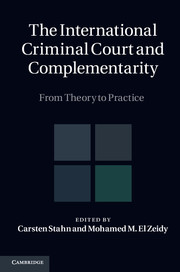Book contents
- Frontmatter
- Contents
- Acknowledgments
- Foreword by HE Judge Sang-Hyun Song
- Foreword by Patricia O’Brien
- Foreword by Silvia A. Fernandez de Gurmendi
- List of abbreviations
- Introduction: bridge over troubled waters?
- PART I General reflections
- PART II Origin and genesis of complementarity
- PART III Analytical dimensions of complementarity
- PART IV Interpretation and application
- 14 The application of the principle of complementarity to the decision of where to open an investigation
- 15 Situation and case: defining the parameters
- 16 The inaction controversy
- 17 The admissibility procedures
- 18 The evolution of the ICC jurisprudence on admissibility
- 19 Interpretative gravity under the Rome Statute
- 20 Complementarity and burden allocation
- PART IV (Continued) Interpretation and application
- PART V Complementarity in perspective
- PART VI Complementarity in practice
- Index
- References
16 - The inaction controversy
Neglected words and new opportunities
from PART IV - Interpretation and application
Published online by Cambridge University Press: 05 November 2014
- Frontmatter
- Contents
- Acknowledgments
- Foreword by HE Judge Sang-Hyun Song
- Foreword by Patricia O’Brien
- Foreword by Silvia A. Fernandez de Gurmendi
- List of abbreviations
- Introduction: bridge over troubled waters?
- PART I General reflections
- PART II Origin and genesis of complementarity
- PART III Analytical dimensions of complementarity
- PART IV Interpretation and application
- 14 The application of the principle of complementarity to the decision of where to open an investigation
- 15 Situation and case: defining the parameters
- 16 The inaction controversy
- 17 The admissibility procedures
- 18 The evolution of the ICC jurisprudence on admissibility
- 19 Interpretative gravity under the Rome Statute
- 20 Complementarity and burden allocation
- PART IV (Continued) Interpretation and application
- PART V Complementarity in perspective
- PART VI Complementarity in practice
- Index
- References
Summary
This chapter demonstrates and examines a curious interpretive disconnect in the complementarity discourse. Many commentators insist that admissibility due to state inaction is a ‘gloss’ and an ‘invented’ prong, and have expressed alarm and concern about the International Criminal Court's departure from the Rome Statute. Such critiques are rooted in a surprisingly widely-shared and firmly-held belief that Article 17 creates a one-step test based entirely on the famous ‘unwilling or unable’ criteria. However, as this chapter demonstrates, Article 17 expressly provides not a one-step test, but a two-step test, the first explicit question of which is whether a state is investigating or prosecuting the case or has done so.
Nonetheless, the fifty-five words of Article 17 that explicitly require a national investigation or prosecution routinely disappear into a shared blind spot. The popular simplification of complementarity is so entrenched that when the Court applies the actual Article 17, the Court is accused of ‘departing’ from the Statute and ‘inventing’ new requirements. While many commentators find it a mystery that the Court believes that a case is admissible in the absence of proceedings, the real mystery is why this proposition is controversial. This chapter provides examples from the literature to demonstrate the existence, prevalence, persistence and impact of this strange disconnect. Once misplaced recriminations about Statute violations are set aside, we discover rich ground for a much more exciting debate about the role of the Court vis-à-vis national systems.
- Type
- Chapter
- Information
- The International Criminal Court and ComplementarityFrom Theory to Practice, pp. 460 - 502Publisher: Cambridge University PressPrint publication year: 2011
References
- 2
- Cited by



